#Pithy Production
Explore tagged Tumblr posts
Text
The Fountain (2006) is an oddly lopsided film, quality-wise.
If you were to draw a graph of the process of film production, with time on the horizontal axis and "how well they did this part in The Fountain" on the vertical, you'd get a U-shaped curve. (Fountain-shaped?) As in:
The ideas (earliest in the process) are great. You could totally make an excellent film with the same premise, the same themes, the same broad-strokes plot.
The writing and acting (in the middle) are bad. Seriously bad. Cringe-inducingly, at points.
The visual effects and music (last, or at least conventionally grouped under "post-production") are... also great. Beautiful, moving, sublime – and perfectly fitted to the great film you can imagine someone making on the basis of point number 1, but which The Fountain wasn't, because of point number 2.
It's a frustrating viewing experience, in a fun kind of way. Or a fun one, in a frustrating kind of way.
It's the kind of "promisingly flawed" material that inspires people to write fanfic, except that the process of "writing fanfic where this was a better movie" has been partially incorporated into the filmmaking process itself. The post-production people are trying so hard to save the original idea – and succeeding, insofar as it is within their power to do so!
But alas, their powers have limits. You simply can't make bad writing/acting into good writing/acting "in post." Or you couldn't in 2006, anyway.
(It's an especially fun/frustrating experience as someone who – while I have no other talents related to filmmaking, and have never been involved in a film – considers himself to be a pretty damn competent writer. I kept wanting to yell at the screen: "please, just stop, and let me write it for you! I can fix it! I know how, if you'll let me!")
#to be clear: i don't actually think it's likely that some people working on the film felt they were 'trying to save the original idea'#it's just a pithy way of describing what the final product feels like
64 notes
·
View notes
Text
Is CloverWorks entirely at fault for TPN S2's mangled production?
I see so many people default to blaming CloverWorks for being the sole arbiter of S2's horribly disappointing production (sometimes Shirai is added into the mix too, especially by anime-onlys), but every time I do I'm genuinely asking the question of whether that's true and where they're pulling their information from.
I'm not involved in the animation industry at all so I'm interested in receiving input from people who are more familiar with it, but my understanding is the people in charge of the decision to truncate S2 would be The Promised Neverland Committee listed at the end of the opening credits.
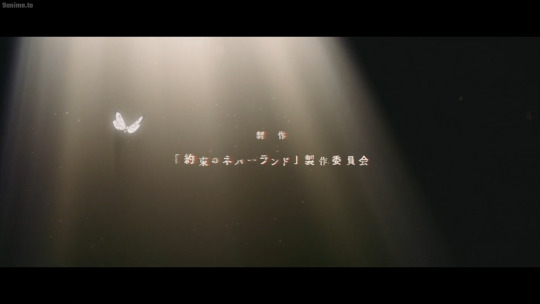
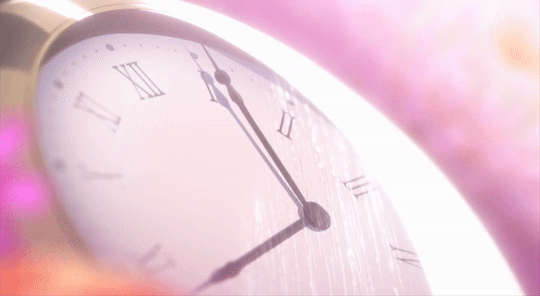
(I could not find a single video of the English dub that aired on [adult swim] for the English credits of S1, so a screencap from the Japanese credits)
TPN Committee is comprised of the following entities: Aniplex (Distributor), Fuji TV (TV Station), Shueisha (Manga Publisher), Cygames Anime Fund, Dentsu (ads)
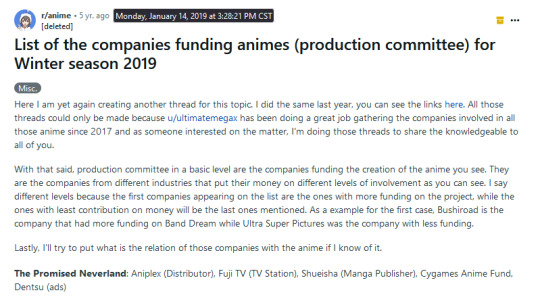

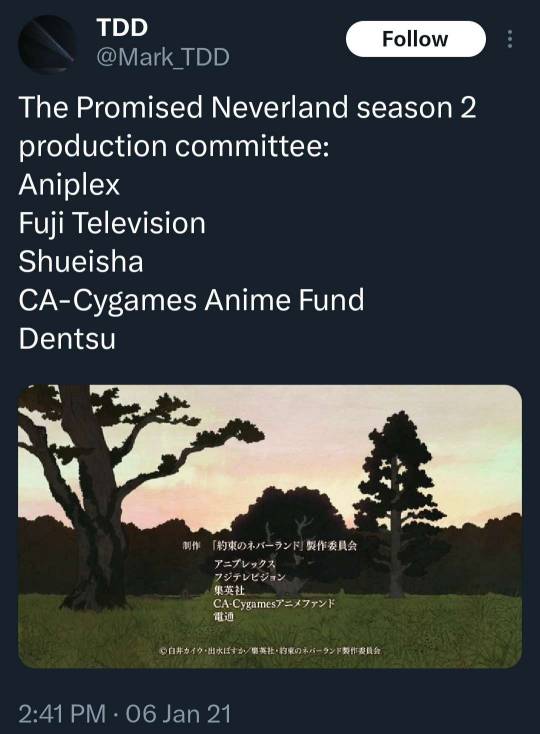
(Sources 1 | 2 | 3)
kViN from Sakugabooru details what a production company is in this post:
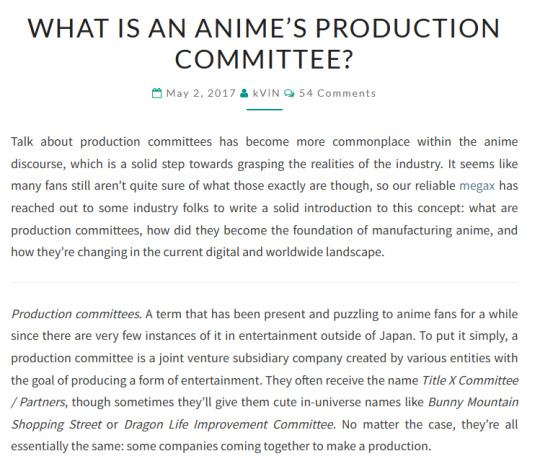
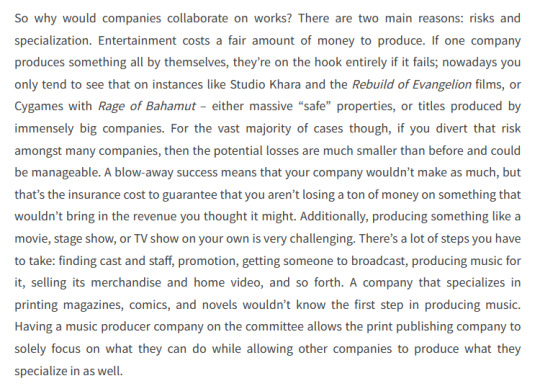


"I personally find it enjoyable to see who is involved in a show, and as you’ve seen there is plenty of information to draw from that. Animation production studios are listed in the credits for each show, so it’s understandable why audiences would imagine they have a ton of influence over a production. It’s even natural to think that the company that is actually manufacturing something would have great input! If you start paying attention to these committees though, you get a clearer picture of the finances of production and how each show is actually made rather than assume that studios that often don’t have much of a say are in charge of everything."
And CloverWorks is the more prominent name, especially for English speakers watching the subbed version of the series.
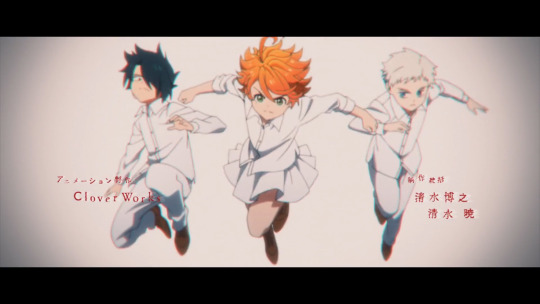

This is also something that Geoff Thew brings up in the last seven minutes of this video around the 18:50 mark:
youtube
"I'd bet good money that the last credits were supposed to roll right after that big stone door slammed shut, and I'd further wager that a combination of fan reactions to and dipping ratings for early episodes is what caused the production committee—who are the ones who actually have final say in this, not Cloverworks or even Shirai—to cut their losses and turn that cliffhanger into a skeleton of a conclusion."
I disagree with him on them making the call to retool the series during the clipshow episode between S2e05 and S2e06 though. It doesn’t seem like they had enough time to do that when a single episode of animation takes on average nine months to complete, even with the ridiculous crunch they seemed to be in. My guess is it was made back in early 2020 after Shirai made everyone involved in production aware the manga was ending that year, with the pandemic potentially factoring in to a degree.
He also mentions this a bit earlier:
"It's just such a slap in face to anyone who ever gave a shit about any version of this story. Including the people telling it, apparently, since neither of the anime's screenwriters nor mangaka/series composer Shirai wanted to take credit for the last two episodes. They probably didn't have much say in how it all went down. That's important to keep in mind before you start yelling at animators or even studios on twitter. I guarantee that every adaption that hurts you personally was ten times harder on the people who actually had to make it. As hackishily slapdash as this finale is, a lot of people probably slept under their desks to get it out the door, if they slept at all."
I always come back to this tiny addition toward the end of S2 episode 2 as an indication that on the creative side of things, in storyboarding and animation at CloverWorks, the care was still there at some level.
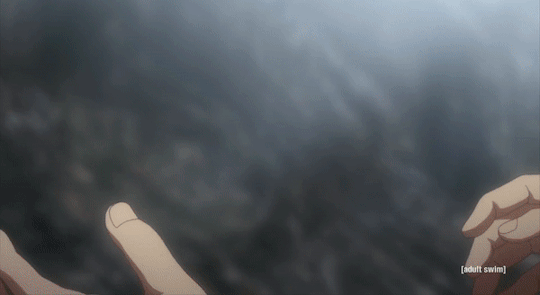

It was just squashed down in order to cut and condense 146 chapters into 11 episodes for a production that, as ZersEditor puts here, was "bleeding money."


But CloverWorks is less to type out, so they get the majority of the ire over a tragically butchered production in casual conversation.
#The Promised Neverland#Yakusoku no Neverland#TPN#YnN#約束のネバーランド#約ネバ#Kaiu Shirai#CloverWorks#TPN Committee#FSS Chatter#TPN S1#TPN S2#TPN S2e02#Long Post#I'm not trying to portray CW as a saint of a studio because again I'm not involved in the industry so I don't know all the nuances to it#and this production of theirs is the one I'm most familiar with‚ with the other one being S×F for comparison#and like Ruby's pointed out in another post I can believe they're complacent in the lightening of skin tones for characters of color#as part of a larger industry-wide trend which is still shitty and should be critiqued#but I don't think they're the only ones guilty of this#so it kind of deflates me a bit when I see people comment on my posts taking a dig at CW#because it feels like a pithy comment of misdirected ire when the body of people actually at fault#get to continue on with their business of utilizing stories as investments to build up portfolios#instead of any genuine interest in a series' story or artistic merits#so then I kind of zone out even if I agree with the spirit of the sentiment of grieving over a series you care about#like “is it their fault? is it? are we talking about the same thing/on the same page here?”#tbf people are probably making more productive use of their time than I am#after delving into this for a sense of personal closure on how S2 turned out the way it did lol#but if anyone has any further reading on the subject or personal insight and feels like sharing I'd be interested#either in CW's favor or against
23 notes
·
View notes
Text
im like legit mad at hailee steinfeld about this ad campaign. the stupid videos keep getting served to me on youtube and if i hear this woman tell me some bullshit about how every woman over 20 neeeeeds this product or else they will become a decrepit aged old crone by the age of 30 one more time i am going to kill someone

#shut the fuck up hailee u literally don't look like that because of neutrogena#youtube also keeps giving me ads for botox cosmetic?? they're insane it's like videos of people being like “look how expressive my face is!”#i feel like botox shouldn't be allowed to advertise on youtube....#certainly not in the way that they are. which is without saying what the product is#because “inject plastic in your face!” isn't a very pithy ad slogan i guess#bri babbles
1 note
·
View note
Text
If this is referring to what I think it is, I think the point of that post was not “let’s go kill some oil executives” but “if we lowered the production of one oil company by 1% for a month this is how much climate change would be mitigaged.” “Kill one oil executive” was just a pithy piece of rhetoric to represent that change and to show how much more impact some have on the climate than others. Like most pithy pieces of rhetoric, it’s flawed
(All that being said I get the point you’re making, lol)
The thing about killing an oil executive to lower carbon emissions, or similar ideas, feels fundamentally like dream logic. It's bizarre to me how common this kind of thinking is. Like the thing about how the planet isn't dying, it's being killed by people with names and addresses. It's like...sympathetic magic. That if you kill someone associated with a bad thing, it will stop the bad thing. Like climate change is the boss in a video game and you have to hit its weak points
#personally I think industrial sabotage is a better pithy piece of rhetoric#most supply chains have so little room for error that intentionally and secretly messing them up could temporarily reduce oil production by#a lot#but what do I know?
3K notes
·
View notes
Text
Trying to draft a post about the "Shakespeare is meant to be seen not read" take I disagree with but my opinions are too complicated for pithy tumblr essay paragraph format and I keep giving up. I think the short version of my conclusion though is that for good contemporary Shakespeare performance to exist, no one production can or should ever be considered the definitive version.
#i will return to this.#coming at this from a very pro Shakespeare performance standpoint obviously. im a Shakespeare actor.
77 notes
·
View notes
Text
@coyloves ship & prompt: “Look how messy you are” w/ Osamu Miya ˚₊˚✧🍙✧˖°🍂

"I've been thinking about bending you over this table and just having my way with you" His knuckles caressed your chin before he gripped your jaw and made your head tilt to the opposite side of his face, to have easier access to your neck and kiss it. He smiled when he felt you straighten up, product of shivering. "You like the idea?" you thought you nodded, but it was so subtle your movement that it was enough for Osamu to understand that when you were speechless, it was because you found his proposal more than decent.
It wasn't the first time you had sex in the store. The routine would end up being the same as all the other times before: Osamu wooing you until he had you right where he wanted you, clumsy hands caressing each other's body, quick and warm kisses, and discretion in moaning so he could pay attention to the door bell in case Kita came carrying bags of rice. The last time was fun, despite the fact that you almost got caught red-handed.
"We should be quick."
"Yeah" Osamu said in a sarcastic tone. "I can see you're in a hurry" He pointed his gaze at the wetness in your panties, licking his lips, holding back from touching you still. "Look how messy you are".
"Samu! are you even listening to me?"
"I'm trying to pay attention, but you're just too sexy. Not gonna lie."
"Then, tell me what you want me to do" His grayish eyes bore into yours, able to read what they expressed.
Then Osamu lifted you up and sat you on the cold marble table of the warehouse, taking a quick glance at your body, stunned by the beauty of your curves, savoring them in his mind, decanting and amusing himself with his favorite parts.
"Let me hear your beautiful moans a second time today, darling" His thumbs played with the inside of your thighs, spreading them open, allowing a glimpse beneath them of your chubby pussy. "Hah… shit" He exhaled excitedly. His hips rocked forward instinctively, needing to have you lying there on your back for him, legs spread wide.
The throbbing in his chest began to ache as you lay back on the table and circled his hips drawing him to you, pulling your shirt up and exposing your large breasts squeezed into your bra.
"You're going to fuck me?"
"Fuck… Of course I do" In a quick set of hands, Osamu unclasped your bra as he worked his way under your boxers, reaching for his cock and pumping it a couple of times while his mouth was distracted with your breasts. He didn't skimp on making as much noise as possible as he savored and kneaded them at the same time, sucking your nipples and pinching them on his lips before releasing them. "They are so perfect… just mine" He kneaded relentlessly, and when he noticed that his cock was about to burst through his underwear, he released it as best he could, —caused by nervousness and quickness by the impatience of being inside you—, and pushing aside your panties, he entered you ever so slowly without losing sight of the expression on your face as he filled you.
"Atta girl, fucking your boss in his own warehouse, huh?"
He settled into a steady rhythm, and cursed himself for not having taken you earlier at that table. The movements of your body in response to his thrusts were something Osamu had yet to deal with. The bouncing of your tits followed by pithy gasps flooded his mind so quickly and directly, that in order to speed up the command his brain sent to his cock, he had to take possession of your hips and lighten the pace. His mind clouded as your insides tightened and his ears filled with his cursed name, thus ignoring —though not willingly—, your warning you were cumming. Osamu forgot the discretion agreed upon at the beginning and made sure to fuck you in the roughest way, letting anyone planning to enter the store know that he was busy to attend to any customers or receive any packages.
Maybe that day, the "closed" sign would remain hanging on the door for another hour.
#haikyuu smut#hq smut#haikyuu x reader#haikyuu scenarios#haikyuu x imagines#haikyuu osamu#osamu headcanons#osamu smut#osamu imagine#osamu x reader#osamu x reader smut#miya osamu x reader#osamu x you#osamu x y/n#osamu x chubby reader#chubby reader#chubby reader smut#osamu x female reader#ship & prompt haikyuu#ship & prompt smut#haikyuu ships#miya osamu x you#miya osamu x y/n#osamu miya x reader smut#osamu miya x you#osamu miya x reader#osamu miya smut
696 notes
·
View notes
Text
When I first glanced at the headline about Ukraine's drone attack on Russian military planes I thought it was similar to times in the past when they took out two or three planes at Russian bases. But when I saw all the details, it was more like: "HOLY FUCK!"
Ukraine not only took out a bunch of Russia's most expensive military aircraft, but they did it in an ingenious and painstaking way. Planning for this apparently began in late 2023.
It's hard to exaggerate the sheer audacity - or ingenuity - that went into Ukraine's countrywide assault on Russia's air force. We cannot possibly verify Ukrainian claims that the attacks resulted in $7bn (£5.2bn) of damage, but it's clear that "Operation Spider's Web" was, at the very least, a spectacular propaganda coup. Ukrainians are already comparing it with other notable military successes since Russia's full-scale invasion, including the sinking of the flagship of Russia's Black Sea fleet, the Moskva, and the bombing of the Kerch Bridge, both in 2022, as well as a missile attack on Sevastopol harbour the following year. Judging by details leaked to the media by the Security Service of Ukraine (SBU), the latest operation is the most elaborate achievement so far. In an operation said to have taken 18 months to prepare, scores of small drones were smuggled into Russia, stored in special compartments aboard freight trucks, driven to at least four separate locations, thousands of miles apart, and launched remotely towards nearby airbases.
The drones were launched inside Russia from modified cargo containers on trucks. The destroyed aircraft included those used to launch missiles against Ukrainian civilians.
"These strategic bombers are capable of launching long-range strikes against us," he said. "There are only 120 of them and we struck 40. That's an incredible figure." It is hard to assess the damage, but Ukrainian military blogger Oleksandr Kovalenko says that even if the bombers, and command and control aircraft were not destroyed, the impact is enormous. "The extent of the damage is such that the Russian military-industrial complex, in its current state, is unlikely to be able to restore them in the near future," he wrote on his Telegram channel. The strategic missile-carrying bombers in question, the Tu-95, Tu-22, and Tu-160 are, he said, no longer in production. Repairing them will be difficult, replacing them impossible.
Russia likes to think it is invincible. These successful attacks, as far north as the Kola Peninsula and as far east as south central Siberia, are a psychological blow as well as a military one to Russians.
This is the best overall description of Operation Spiderweb. The narrator is author and retired US Navy Seal Chuck Pfarrer.
youtube
Back to the BBC article...
Ukrainian defence journalist Illia Ponomarenko, posting on X, puts it another way, with a pointed reference to President Volodymyr Zelensky's infamous Oval office encounter with Donald Trump. "This is what happens when a proud nation under attack doesn't listen to all those: 'Ukraine has only six months left'. 'You have no cards'. 'Just surrender for peace, Russia cannot lose'." Even more pithy was a tweet from the quarterly Business Ukraine journal, which proudly proclaimed "It turns out Ukraine does have some cards after all. Today Zelensky played the King of Drones."
That comment from Business Ukraine sparked this meme...

Ukraine has plenty of cards, and it ain't bluffing.
REMINDER: Putin's "3-day special operation" in Ukraine began 1,195 days ago. Putin's continued pointless aggression suggests that he's not playing with a full deck.
#invasion of ukraine#operation spiderweb#uav#ukrainian drone attack on russia's bombers#surprise attack#ingenious military tactics#vladimir putin#embarrassing loss for putin#russia#sheer audacity#chuck pfarrer#ukraine#sbu#volodymyr zelenskyy#king of drones#oleksandr kovalenko#illia ponomarenko#donald trump#ukraine's cards#бпла#владимир путин#союз постсоветских клептократических ватников#россия проигрывает войну#руки прочь от украины!#дональд трамп#володимир зеленський#СБУ#йдемо на ви#слава україні!#героям слава!
72 notes
·
View notes
Text
Christian moral teaching feels very immature to me, and maybe that's because it's something I believed when I was younger and have since grown out of, but I think it's also a product of the apocalyptic view of it all. Your moral reasoning is just going to be very limited if you perpetually think the world is about to end. Why bother saving the environment? Why plan for the future? Get martyred. Sell all your possessions and live with the poor. Some things sound good on the surface, but then you have to live with the choices you made, and the world isn't ending, and suddenly you actually have to deal with all the nuances of a conversation that can't be summed up in a pithy scripture quotation.
269 notes
·
View notes
Text
The Sheenant Chronicles: Michael Sheen, RADA and 'Hay Fever'
An interview with Royal Academy of Dramatic Art's Geoff Bullen and directing the student in his 1991 graduate production of the Noël Coward play
Part of the joy in researching an actor’s history is uncovering the unsung heroes that helped guide them in performing while elevating their talent.
There are many of those special people in the life of Michael Sheen. As many of you who know about The Sheenant Chronicles, Patricia Browning of A Tennantcy To Act and I have delved into the lesser-known aspects of both Michael and his contemporary acting half/best friend David Tennant with shared roles throughout their careers.
As our scope encompasses work that — due to time and technology — is not digital-friendly, most of what we find relates to more, shall we say, analog conventions and interviews with those who were there to bring their skillfulness to the fore. One of those for Michael was Geoff Bullen.
Geoff may not be one of the more recognizable names in the ‘Sheendom,’ but, his role was just as critical to his acting future as you’ll find. Coming into Michael’s orbit via the Royal Academy of Dramatic Art (RADA) in 1991, Geoff was the director for that graduating class’ production of Hay Fever. Written by acclaimed playwright Sir Noël Coward in 1924, it’s well known for its scathing and comical take on the British class system, including the wayward and warring factions within the Bliss family. Michael was cast as Simon Bliss, the attention-seeking, dramatic son who fancies himself a caricature artist. Alongside classmate Jane Robbins who portrayed his flighty and petulant sister Sorel (and later played Michael’s wayward wife in 2002’s Heartlands), the two characters begin Hay Fever in high form with an eight-minute introduction full of bickering and pithy dialogue.
Precious little exists for posterity, considering it was one of many student productions that RADA has conducted over the decades. While distance from the event now feels otherworldly to those of us schooled in Michael’s career, it’s a plain fact that it’s been 35 years and we can only take away what one recalls from memory in the early days of his career. Fortunately, I was able to speak with Geoff in a recent interview about his time there.
But first, some background on Geoff: Born and raised in Cornwall, Wales, and a graduate of Manchester University, he was enthralled with various shows he saw on holidays with his parents in Blackpool. His first professional part at age 18 was as the officer in Molière’s Tartuffe — and he “just dried stone dead,” he recalled. “I can remember all the faces of the other actors going, ‘Oh, shit! You know, we've got this kid!’ They were then trying to improvise, and I was cool as a cucumber.”
He began his run at RADA in the early ‘70s with a recommendation coming from David Carson (Star Trek Generations), interviewed with Principal Hugh Cruttwell, while working on several shows, including Harold Pinter’s A Night Out and Sandy Wilson’s musical The Boy Friend.
Working more as a freelancer than a staff member, he directed in regional theatre and would return to RADA at intervals, at one point serving as Chair of the audition panel for the school. He directed three versions of Agatha Christie’s The Mousetrap and his last full-time position with RADA was as Director of Actor Training.
Geoff provided several anecdotes about Michael, one of which was his last time seeing him in person in 2014:
”I had the opportunity to do this thing at Buckingham Palace. I met the Queen. And Helen Mirren was there. But my first meeting with her, I was 15 [playing Proculeius] and wrestling with her on the stage at the Old Vic, trying to disarm her, as she was playing Cleopatra!
“And funnily enough, that was the last time I met Michael Sheen. [Ed. note: Michael had been in London to present at the 2014 BAFTA Film Awards]. This was all a big fundraiser. So all the great and good of the [RADA] graduates were there. Mike was there and yes, I remember, because he was extremely cordial. We didn't speak much. We just sort of embraced. I remember thinking, ‘Oh, my God, Michael, you’re thin! You’re bony!’”
As Michael was graduating in 1991 — and simultaneously committing to his first professional role in When She Danced with Vanessa Redgrave — Geoff provided some context for Michael’s RADA end-of-term requirements.
“Schools have a showcase. RADA has the Tree. He left early to do this job and then came back to do the Tree. The showcase was named after [RADA founder] Herbert Beerbohm Tree. So, he did a speech from Peer Gynt. It's a modern rendition of it, which was popular at the time. It was incredibly dynamic. All I can remember is this sort of twisting gesture which is very effective. He was brilliant as the Bliss boy, but this was like a transistor radio attached to Battersea Power station. He had such dynamic and presence. It didn’t overbalance, but one was aware of the floodgates of his talents.”
With regards to Hay Fever, Geoff further elaborated on what it took (and to this day, takes) to bring Coward to the stage.
“Hay Fever, I think, is my favorite. The characters are brilliantly drawn. It’s incisive. It’s economical. It’s very, very satisfying to watch. Coward was a very serious man in many ways. A serious worker, a masterful playwright. In drama school, it’s very difficult for inexperienced or learning actors to get the balance, the degree of knowing and innocence. The whole thing about Hay Fever is that the Blisses, in their different ways, are complete innocence.
“I do remember one of my proudest moments was the end of the first act when they’re having tea and I choreographed this whole routine where plates were passed around and cups and saucers and it ended up with the Bliss family with cups and saucers and cake on plates — and the guests with none! [RADA] Principal Oliver Neville particularly praised me for that and said that some friends of his in the business had seen it and said it was a masterpiece of fast technique.”
I asked Geoff how the roles were chosen for the students who would perform for their final year. In essence, was there an audition process?
“No, there has never been an audition system for roles at RADA. The roles are allocated. The idea is that everybody gets a fair break. But some people feel they don’t. Occasionally you did get people from early years coming into finals productions.”
This statement would square with an online conversation Michael had with director Rufus Norris discussing the 2024 production of Nye. For those unaware, Rufus — a 1989 RADA graduate — was in his final year production with Thomas Middleton’s A Chaste Maid in Cheapside. Both recalled that Michael, as a first-year student, came into the role of Davey Dahumma on a recommendation from Principal Neville to replace someone who was “voluntarily dropping out” (Michael’s recollection) or that the play was in terrible shape! (Rufus’ recollection).
I was curious as to the audience for these types of performances: who would be watching a young Michael as Simon Bliss onstage at the Vanbrugh Theatre in February 1991?
“Obviously, the agents. Casting directors. Interested members of the profession. There used to be a Vanbrugh Theatre Club, which was the supporters club. That’s the audience. In those days, it would have opened — there weren’t many performances — on Thursday, Friday and two performances on Saturday. It was quite skinny. And Michael was an extremely clever guy. He knew what the style was.
“As I remember, at the time there would be a feedback session, a collective feedback session with the staff. Of course, teachers would buttonhole students in on the staircase and all that. And they get feedback in classes.”
The fly in the ointment to the situation surrounding a student such as Micheal would be an interruption in his studies to take on a role outside school. How did that sit with RADA? Geoff sounded equal parts resigned to reality and theory.
“This still goes on. It was always a bone of contention. You know: should you let students go? Or is this a three-year training? It needs to be three years of training. But then some views are like, if you’re training them to act well, then why not let them go and act? Agents are kind of specifically requested — very strongly requested now —not to ‘talent spot’ and hoover up the most promising actors and offer them positions prior to their completion or near the completion of their training.”
One final insight that Geoff was able to provide was that of Michael's first professional role: Alexandros Eliopolos, the devoted Greek pianist in Martin Sherman’s 1991 play When She Danced. Notwithstanding the reviews the company earned during its run at The Globe Theatre, the play was first taken to the Brighton Theatre Royal in late July for what could be termed a ‘soft opening.’ I was intrigued by that unearthing and asked Geoff why this caliber of talent would choose a location so geographically removed from London.
“Brighton was the classic kind of pre-West End you would go to. Do you know the Brighton Belle?” I replied I had not. “It ran from Victoria Station to Brighton [until 1972]. You could go in the morning, get on the train and have your breakfast, get to London and then after the show you could take the last train back to Brighton. So there’s that connection. It would be kind of like London — a West End audience — in sort of microcosm.”
Geoff currently teaches two or three times a year online. “A course of five consecutive evenings. It’s for people who want to start Shakespeare, feeling that they’re a bit scared. I try to demystify it and have a laugh.”
I’m hoping to share in another edition of this series, a later piece of work of Michael’s that has a secondary connection to Geoff. And of course, this wouldn’t be The Sheenant Chronicles if I didn’t include a teaser for something that will be written about in the future by my ‘proto-Davidologist:’
11 notes
·
View notes
Text

This post, in response to the common phrase "kill the cop inside your head", is just dumb. A perfect example of the twitter-style one-line joke that the author believes is some cutting Oscar Wilde-like witticism, but is just a stupid self-own, that reveals the author's ignorance.
Oscar Wilde, who was a great writer that could actually write pithy one-sentence aphorisms like this that were actually insightful, and one of those from the play An Ideal Husband could actually stand as a great rebuttal to the screenshotted post: "Morality is simply the attitude we adopt towards people whom we personally dislike."
But let's dig deeper.
Because, yes, for most people "the cop in your head" and their "moral compass" is the same thing. They view morality, as laws that aren't enforced by the police, and sometimes take it upon themselves to enforce them.
That's because conventional morality is a product of the same class society that created the law and the mechanism to enforce it. The law, the police and morality are all tools of control and oppression for this class society. A society's morality is part of the ruling ideology that justifies that society, the ideas of the ruling class that justify their rule. It's how capitalism and the patriarchy justify itself, it's how the bigotries it produces are justified.
And that morality is taught to society's members through institutions like the family, schools, the media and its laws, and internalized by the individuals, that internalization of what you are taught is what most people call their "moral compass".
So yes, please critically examine the values you were taught, "kill your moral compass."
The screenshotted post should also be understood in context. The Real reason it exists is probably to vaguepost about a post made by Maia Crimew a few days before. The fact that a post by a transfem defending sex workers and kinksters caused this reaction is in itself proof of how rotten the edifice of conventional morality is, with its reactionary sexual morality and transmisogyny.
25 notes
·
View notes
Text
arcane s2 spoilers and criticism if you care about that. i’ve said most of this a thousand times on discord but posting it on my blog is probably needed. disclaimer that i haven’t finished s2 and probably won’t due to the bigotry, so most of my knowledge after ep 7 is from friends and secondhand.
i don’t even think viktor’s s2 arc is THAT bad if you completely isolated it. the animators went the fuck off. his human face melting open to become that is cool as hell. the concept of selling your soul to save your own life is not novel and i have other characters on this blog who do sell their souls, and i love the trope (griffith, v). if i trust someone enough i wouldn’t mind eventually roleplaying s2 in an au (with changes to it obviously) because like in a vacuum it’s not even bad? id love to see viktor become a product of all the ableism and discrimination that all characters (yes even jayce) fall into. i’m not so devoted to s1 that i can’t pick out concepts from s2 that i like. and villainous viktor would hit.
it’s all the other narrative fat around it that i hate tbh: the salo plot, the wheelchair stereotypes, the way that zaunites become villainized in conjunction with zaun having a large disabled population. this isn’t an exclusive s2 problem either. like it never outright says, but heavily implies, that it thinks disabled people are broken drug addicts (salo), stupid (viktor’s commune), untrustworthy (the lepers in zaun who betray caitvi), or dangerous (sevika, viktor, singed, silco). a pithy little comment about “you’re perfect the way you are” doesn’t change the subliminal messaging of two whole seasons, and an arc like viktor’s will always ring hollow in that context. especially when other able bodied characters aren’t held accountable by the narrative in the same way viktor or other disabled characters are. disabled characters in arcane are held responsible for all small mistakes, every moment of careless trust or selfishness or laziness or arrogance; able bodied characters, meanwhile, are allowed to maintain moral ambiguity without any comment or implication from the narrative. the double standard is crazy. truly textbook ableism that is embarrassing to behold, frankly.
anyway. with all of that disclaimer out of the way (that my friends have heard 383848 times), machine herald viktor can get it. it’s a sexy design. the mask paralleling his autism masking? the emphasis on his bad leg? the eyes that literally glow? i’ll figure out some way to throw the anomaly au at that. especially given that i think viktor would try and remove the parts of him that have been compromised and replace them with prosthetics a la his LoL design; the concept of bodily possession and fighting the arcane with his mechanical knowledge as best he can is interesting to me. he should be allowed some more body horror as a treat.
#file : viktor.#ooc.#i really would like to finish s2 eventually but the ableism is some of the most egregious ive ever seen in a media in my life#not just casual accidental but a true hatred and dislike for disabled people is displayed#a true belief that we are worthless/drug addicts/evil/sexless/etc#not even getting into the homophobia but thats another postttt#anyway viktor and the anomaly freaking it sensitive style
11 notes
·
View notes
Note
could you explain what you meant with communists and encouraging consumption vs public spending?
feels like a snarky remark that went way over my head
One of the things that brought up in historical leftist discussions is that Maoist China and the USSR didn't really have good national welfare programs of the social-democratic sort, in China they had the "Iron Rice bowl" which tied benefits to job and I don't know the pithy name but I believe USSR had something similar with benefits tied to your job.
And there is a Marxist tradition of calling social-democratic welfare benefits paltry trifling giveaways compared to socialization of production which must be the goal.
20 notes
·
View notes
Text
To build a meritocracy
About a year ago, we at Affirm decided to add an OKR to our annual planning titled “High-Performance Culture”, to help shore up the necessary means (for the necessary means) of improving our collective productivity. (Yes yes, big company stuff, whatever – we grew revenue 46% last fiscal year on essentially flat headcount, that’s pretty addictive, and it doesn’t hurt the stock price.)
We measure this OKR by asking every Affirmer a handful of questions about their experience getting work done, eg “do you feel like it’s pretty collaborative here”, etc, scoring it on a 10pt scale, and trying to improve our score quarter to quarter. Generally, our score’s pretty high, and trending gently higher, so all good then?
Maybe, but how do you do better? High-performance culture is pretty easy to define: a culture of individuals doing productive work for the company in the most efficient way possible and helping others do the same, while generally having a good time. But what do you actually do [sir] to have such a culture? And what do you not do?
So I jotted down a few incomplete one-liners of what that means to me as Affirm’s founder and CEO. This list is neither exhaustive (I reserve the right to add and remove things here) nor is it even especially well-organized, but culture is like obscenity in Jacobellis v Ohio: you know it when you see it.
So here’s what I see at Affirm.
mission
morality is a key ingredient in everything we do (and don’t do)
integrity is what got us where we are today, never compromise it
consumers, merchants, and capital partners are who we serve
stay humble and be curious about the needs of each of our constituents
take pride in providing safe access to fair credit; don’t judge what consumers use it for
bleed the colors, the values, the mission
merit
Affirm is a meritocracy: your talent, skill, and willingness to put it all to work define you here
we solve multivariate optimization problems – a certain minimum intellectual capacity is required
demand excellence from yourself and from your teammates, don’t settle
work-life balance tends to take care of itself if you love your work
…remember that this is a marathon – take care of yourself and those you love
if you can’t keep up, we’ll try our best to help, but eventually you may have to leave
if you see that someone can’t keep up, you should step in to help them
leadership
we are a culture of individuals working together as teams
once someone is a part of the team, fully accept them as one of our own
whom you hire, and how you help them be productive is your top responsibility
be an owner, not merely an employee
do not allow “us and them” dynamics to foment anywhere at Affirm
run towards a problem; don’t assume someone else will take care of it
be a stress absorber for your team, not a stress amplifier
an occasional heroic act that helps Affirm win is a good thing, not a sign of poor planning
constant heroic acts required for Affirm to survive is a sign of poor planning
lead by example
how we work
we take calculated risks – do the calculating!
make reversible decisions fast
bring the bad news to the team early – we’ll rally to help
use our product and understand its value to our customers
care about how we make things — mind the quality of the invisible parts
…do not let perfect be the enemy of shipping and iterating
time is the scarcest resource we have, be mindful of how you use yours, and your team’s
we are a writing culture, favor short, pithy n-pagers to novels or live rants
post-mortem everything: the successes, the failures, and the near-misses – and learn
we take our work extremely seriously — but not so much ourselves
how we disagree
if you disagree, you must speak up, even escalate – especially before a decision is made
fear of being wrong is not an acceptable reason for not speaking up
never accept an unexplained “no” for an answer – ask why
challenge ideas! good ones can handle the scrutiny, bad ones need to die on the vine
even the harshest critique of your idea is not an attack on you, don’t take it as such
no matter how brilliant you are, being a jerk is a ticket out of Affirm
know our business well, and know your area of the business cold
argue using facts whenever possible, but give your gut a voice too
once the decision is reached, commit
sometimes, Monday starts on Saturday
17 notes
·
View notes
Note
as someone who watched arcane with 0 league knowledge it was kind of insane how season 1 was really impressively tight with its plotting and pacing, and then season 2 was like a plodding mess that put all the characters who bounced well off each other on different ends of the earth
oh! welcome to the riot games problem! this is a pattern that exists in EVERY SINGLE riot project, be it skinlines, games, or arcane
step one: conceptualization. anywhere from 1-10 rioters have an idea, and pour their heart and soul out fighting to make it happen. they are CONSTANTLY fought from above and denied the ability to really work on things
step two: acceptance. the higher ups give them a pithy sum to work with. typically most projects would die in this stage if not at riot games. if a rioter got to the point where they got money they will work 80 hour weeks to make their dream happen. the only joy is the complete creative freedom given
step three: reveal. the product, now finished and shown to the public, can now go down two paths. if its anything other than a booming success, all funding is cut. all ideas are scrapped, all rioters relocated. if a booming success, great! but watch out for
step four: corpratization. having now struck gold, it is not enough to let the creator continue to work with it, the higher ups must meddle. they need to cut into the flesh of what remains and turn it into marketable slop. key creatives may be fired. inexplicably choices, like some sort of noxus setup and tie in, may be forced in.
step five: ruination. the creatives behind this are gone. the interesting roughness and tight design is sanded away, leaving a rounded, perfect sphere, one that can be used and then thrown away when no longer profitable, coasting off of the good will of the dedicated original workers
5 notes
·
View notes
Text
So this isn't going to be pithy or clever or a bit or a story or really anything like the rest of my posts; I just want to write what I feel and put it out into the world. And what I feel, at this very moment, is joy. Every day, it seems, my body becomes more feminine; it's a slow change but every tiny bit of it feels so fundamentally right. I'm becoming the person I've always wanted to be, even though I was too scared to admit I even wanted this body and life up until just last year. And going out in public is just wonderful. Did you know that women just give each other compliments, even if they don't know each other? I mean, I guess I knew it in theory, but I never imagined that a random woman at the dollar store would just out of nowhere say, "Oh my God, I love your dress!" to me. It's simply incredible. And I can cry now! Starting at around thirteen (i.e. bad puberty's beginning) I felt a desperate need to cry sometimes but couldn't manage anything besides a sort of awkward heavy breathing, as though my body refused to acknowledge what my mind was going through. But now my body and mind are in perfect synch, and emotions flow through me like never before.
But all that joy and expression and the simple feeling of rightness, I have to put it aside eight hours a day while I present male at work. I wear loose clothes to hide the changes in my body and speak in a voice I wish I could forget. I'm so much less productive because I can't help but spend free moments checking my transfemme Discords, reminding myself that there's a community out there who knows me for who I really am, not this sad little body forced to play out an obsolete role and routine. Somewhere early in my transition I heard some other pre-transition transfemme make the point that crossdressing for her wasn't putting on women's clothes, but men's. And I thought, Okay, I see how that's technically true, but that's not how it feels, at least for me. Now it's different. Now my life as a woman has become reality at last, and being a man is just this recurring nightmare. A nightmare I'll be spending the next few days in too: I'm taking a trip with my parents this weekend, and I promised to present male the whole time for their sake.
It's not the end of the world. I'll survive it, and I've got a plan in place to be out to eveybody and living as a woman 24/7 within a month. Still, it's just so strange: my life has gotten so much better that what used to be normal has become torture.
#transgender#transfem#trans woman#lgbt#lgbtqia#trans#lgbtq#queer#trans joy#trans pain#hrt#mtf#mtf trans#mtf hrt#estrogen#estrogen is magic
32 notes
·
View notes
Text
Sorry for the long screenshot, wanted to get it all in.
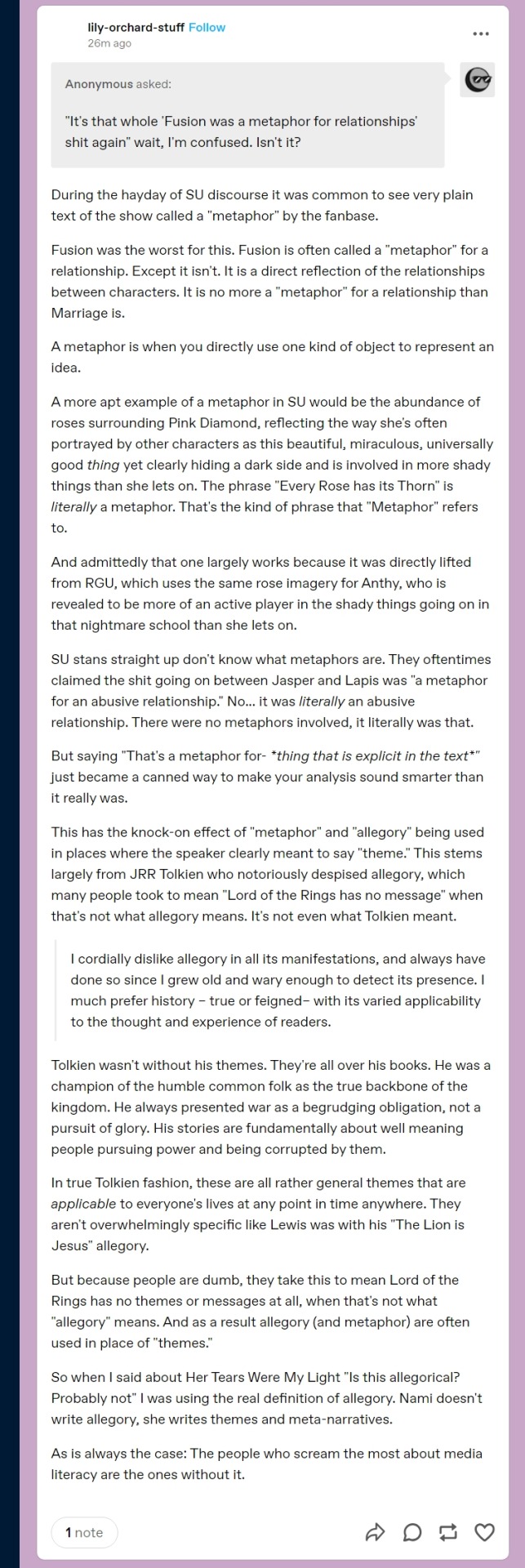
Not going to address everything, but wanted it available to view. Also, I have that complete transparency policy thing. I get itchy if I don't post honestly.
Just for edification, I present the real definition of allegory. It goes thusly: a story, poem, or picture that can be interpreted to reveal a hidden meaning, typically a moral or political one.
I have not played Her Tears Were My Light so I cannot speak to that game's allegorical themes. However, the title alone surely hints at hidden meanings. Tears aren't normally described as actual light most of the time. I also know that the characters are Time (the player), Space and Null. That feels like that might not just be a naming convention. I'd have to see someone else's interpretation of it to know for sure, because I don't trust yours, Lily.
Can we just, for once, leave Tolkien out of this. At the end of the day he was a brilliant linguist who created an amazing world for the language he created to live in. He just got tired of beatniks and bohemians getting wasted and going on about Tom Bombadil and trying to add anti-war and environmental messages were he didn't intend them. Either "death of the author" his works and talk about what you see in them, or abide by his wishes and don't bring up those works. Trying to do both is cringe.
The real definition of metaphor: a thing regarded as representative or symbolic of something else, especially something abstract.
The real definition of a proverb: a short pithy saying in general use, stating a general truth or piece of advice.
Every rose has it's thorns is a literally a proverb.
A rose among thorns is the metaphor you were looking for. The rose themes and images around Rose Quartz is this metaphor and not the improperly attributed every rose has it's thorns proverb. But, hey, you were right about it being metaphorical. A metaphorical theme, in fact.
I think you are only half-right about fusions though. This is just my take, mind you. I think the act of fusing; the two component gems coming together, sure, that's just the relationship. But the fusion itself, the way it looks, the way it operates. The actual being with a name like Garnet or Alexandrite or whatever. I think that's the metaphor.
Like Garnet is generally calm and somewhat easy going without being frivolous because the two component gems inside her are a couple who are happy and content to work as one. That reads metaphorical to me.
Lastly, Lily, something can absolutely be explicit in the text, while also being an allegory, a metaphor, a theme, a simile and a dozen other things. It can even be, as I hope I explained with fusion, the exact thing and a metaphor of the thing at the same time. Especially, when part of the audience is expected to be children.
You know who once did a good job discussing the allegory of a show's source material? Mikailia. @that-one-kiddo-in-the-back recently posted about Mikalia's video on Lego Monkie Kid and I'll let that post speak to how she did on the rest of the video, but she understood that Journey to the West is an allegory for the facets of the human mind.
I'm not even going to complain that she probably only knows that because of Overly Sarcastic Productions videos. That's why I know that. I've also never read the source material and am mostly familiar with adaptations. That's an acceptable way to learn something.
See, Lily, you can listen to what other people say, build on that, and not only will people not call you dumb, they might even praise you for your effort.
Works the same with criticism.
Addendum: Look at that, I became Lily's English teacher for a second, anyway. Cleaned it up. Added a few tags.
9 notes
·
View notes